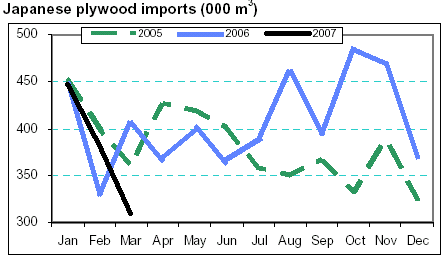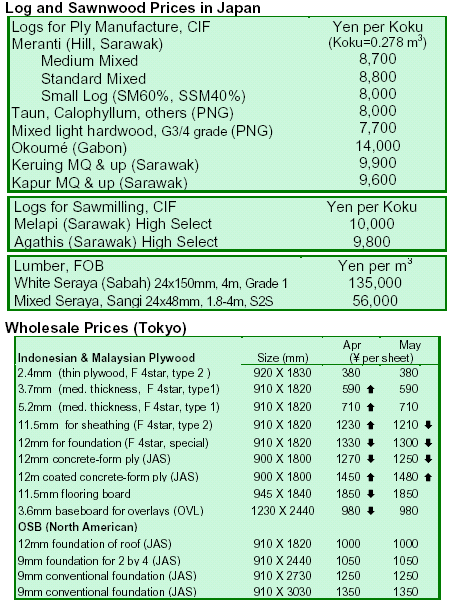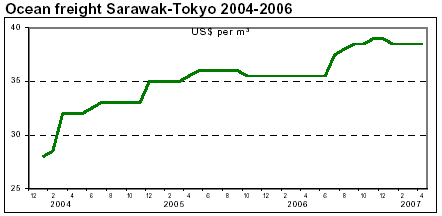|
Japan
Wood Products Prices
Dollar
Exchange Rates of 15th May
2007
Japan
Yen 121.67
Reports
From Japan
Supply of Japanese plywood grows
In March 2007, Japanese markets experienced a 1.5% increase in supply of domestic made plywood from March
2006. Monthly volume of softwood plywood production for the first time exceeded 200 million m3, or 8.1% more
than last year.
In contrast, the total imported plywood in March was 23.8% less than in March 2006. From March 2006 to
March 2007, Indonesian imports were 97 million m3; Malaysian imports were 170 million m3; and Chinese
imports were 28 million m3, representing a decrease of 30.3%, 20.8%, and 28.1%, respectively, over the 2006-2007 period.

Log production recovers in South East Asian countries
Japanese plywood mills are increasing their consumption of softwood logs and reducing their use of tropical
hardwoods. Some logs are in short supply, due to increased demand from Malaysian plywood mills. India is
also aggressively buying meranti regular, causing a tight
supply in the market.
Prices for logs are bullish, since there are low log inventories and active purchasing by local plywood mills.
Additionally, the appreciation of the ringgit against the U.S. dollar has helped push prices higher. In Japan, buyers
are taking a cautious approach to purchasing mixed seraya
and kapur logs due to high prices.
Asahi Woodtech to participate in plantation business
Osaka-based company Asahi Woodtech Corporation plans to participate in a Malaysian run Acacia hybrid plantation
business developed by Koshii & Co., Ltd. The business, which is located in Sabah, Malaysia, consists of 900,000
Acacia hybrid trees covering about 1,000 ha. The Sabah government will provide an additional 5,000 ha in an
effort to increase the plantation’s size. While actual shipments of the plywood generated from the plantations
may not be available until 2020, Koshii noted that if faster growth was possible, the first shipments could be made in
seven to eight years.
Lumber Company notes impact of changes to Brazilian laws
President of Pacific Lumber and Trading Co, Ltd., Mr. Y. Fujiki, recently outlined changes to Brazilian forest law
since the 1992 Rio Summit. He noted that existing areas of timber available for use were the amounts allocated during
or before 2006. As a result, he suggested that hardwood lumber mills would struggle to secure adequate log supply.
However, Fujiki said that Brazilian law might be one of the tightest in the world, and indicated the necessity of
having competent foresters on the ground to write lumber production reports necessary to secure Brazilian lumber export permits.


|